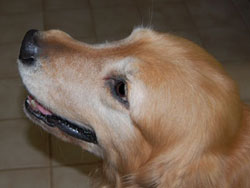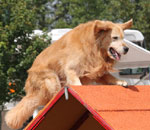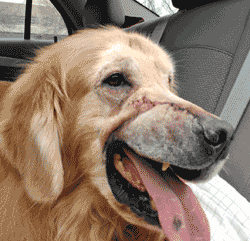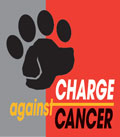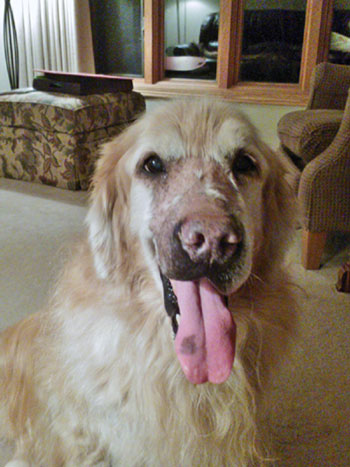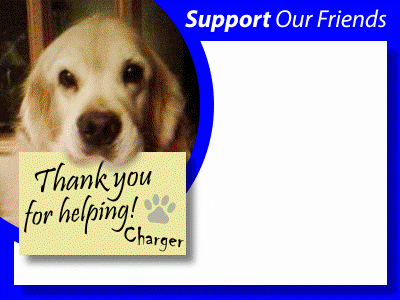Charger
beat cancer, and now his legacy lives on...
Please click here
for his Facebook Tribute
Together
we have raised over $325,000 to fight canine cancers!
With an Agility Club? Join the "Agility Takes Charge
Against Cancer" pledge drive.
Stay tuned for information on the 5th Annual GRCI Sporting Dog Agility Classic, June 21 - 23, 2024!
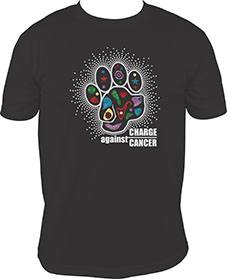
GET
YOUR
CHARGE
AGAINST CANCER
Bling Shirt
$45 includes
shipping
This button takes you to PayPal.
You can either use PayPal or pay with your credit or debit card.

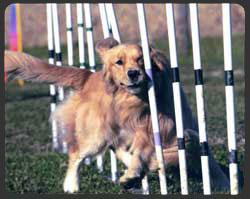
MACH3 PACH AGILGOLD'S TAKE THE CHARGE
MXB2 MJS2 MXP2 MXPB MJP2 MJPB PAX ADHF CCA
December 13, 2002 - October 19, 2015
Dogs, like people, get cancer. Each year, over six million dogs are diagnosed with cancer. In 2010, our Charger was a healthy seven year old Golden Retriever, actively competing in agility, but in May, we noticed a small bump on his muzzle; that little bump was unfortunately diagnosed as a Stage 2 Mast Cell tumor.
We
looked to the University of Wisconsin Veterinary Care clinic for
help. Imagine the shock when the oncologist said that even with
successful chemotherapy, Charger had 6-7 months to live. How
could this happy, healthy dog be gone by December??? Six months later, Charger was in remission, once again competing at an agility trial. And it was at that December trial during the morning briefing, that Charge Against Cancer was founded. 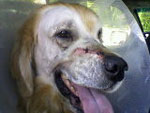
Charge Against Cancer is a canine cancer research fund at the University of Wisconsin School of Veterinary Medicine. The fund is managed by the UW Foundation and covered under their 501(c)(3) status. 100% of your tax deductible donation goes directly to research. Our goal will not be met until we find a cure for all forms of canine cancer.
Charger's cancer returned two more times, but each time, chemotherapies were able to get him back into remission. He continued to fight and live a pampered life, as any dog should.
In 2014,
Charger was the only dog still alive from
that initial clinical trial. Charger's battle with cancer was featured
in On Call, the veterinary school's newsletter. At one of Charger's last check ups, I met a woman whose dog was battling lymphoma. He too was enrolled in a clinical trial where half of the dogs enrolled had died. She questioned whether or not she should continue with his treatment. My advise to her - just because the treatment wasn't working for the other dogs, didn't mean yours wouldn't be the one dog that it helps. It was 5 1/2 years, 70+ appointments, and over 9500 miles traveled, but Charger was living proof that it only takes one to make a difference. The knowledge
gained from clinical trials is how Charger beat cancer not once,
not twice, but three times. Charger died in my arms October 19,
2015, but he DID NOT DIE FROM CANCER! If you would like to help in the fight against canine cancer, please follow the steps listed below:
In
approximately 2-3 weeks you will receive a receipt from The
University of Wisconsin School of Veterinary Medicine is among the
nation's top veterinary schools in the country. The Oncology Service
at UW Veterinary Care is world-renowned for making clinical advances
in the medical treatments of dogs and cats with cancer. Your
donations to the - Research for cancer treatments; - Cancer therapy clinical trials; - Advanced diagnostics and equipment for treating cancer; - Canine oncology education - Comparative Oncology: an evolving field of research, which enables researchers from human and veterinary medicine to explore new cancer therapies. Because dogs and people share the same environment, have similar immune systems, and share 92% of the same genes, canine cancers often resemble human cancers. Human cancer treatments have been successfully modified to treat canine cancers, and vice versa.
Won't you please consider donating to help us eliminate canine cancer? |
| CURRENT
ONCOLOGY TRIALS at *
Repurposing Vaccine Immunity to Treat Cancers * Dogs with Malignant Melanoma * Visbiome vs Metronidazole for Diarrhea in Dogs with Lymphoma in CHOP * Lymphoma in Boxer Dogs
For information on any of the above studies, please click here.
|
Charge Against Cancer is a project of AgilGold Retrievers, Burlington, Wisconsin


